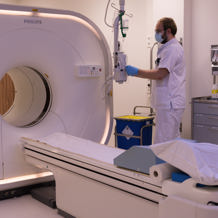Anal cancer
Anal cancer is a rare tumor type. The Netherlands Cancer Society is an expert center for anal cancer.
The prevalence of anal cancer in the Netherlands has increased over the past ten years. It is equally common in men and women and usually occurs in people between 55 and 65 years old. Certain types of infections with the human papillomavirus can increase the risk of anal cancer.
Find out more about the symptoms and the most commonly used diagnostic tests and treatment types for anal cancer on this page.
Causes and symptoms anal cancer
- bleeding from the rectum;
- itching in or around the rectum;
- a jump or mass at the anal opening;
- pain or a feeling of fullness in the anal area;
- narrowing of stool or other changes in bowel movements;
- abnormal discharge from the anus;
- incontinence of stool (loss of bowel control).
A common factor in the development of anal cancer is a Human Papillomavirus (HPV) infection, although many cases don’t have a detectable direct cause. Not everybody infected with HPV develops anal cancer. The risk of developing anal cancer is higher in people who have had multiple sexual encounters involving receptive anal sex, are HIV-positive, or use medication that suppresses the immune system (such as after organ transplants). Women who previously developed cervical cancer or vulvar cancer also have an increased risk of developing anal cancer.
rapid diagnostics
You can usually get rapid diagnostics within five days

Treatment team
After-care and supportive care
Treatment for anal cancer can significantly impact your life. You may experience physical problems like fatigue, bladder or bowel issues, or sexual problems. You may also experience psychological problems like anxiety, uncertainty, or problems with your work and income.
If you are experiencing any problems, we will help you find the right solution for you, or support you with your (sometimes permanent) problems.

 nl
nl
 Nederlands (Nederland)
Nederlands (Nederland)
 English (United States)
English (United States)




